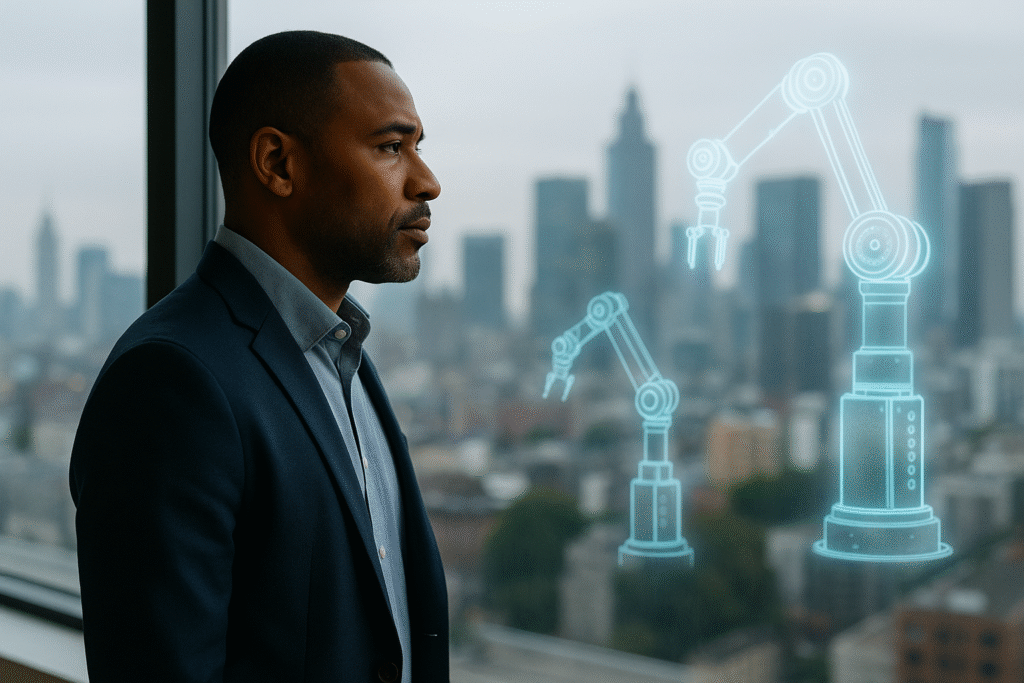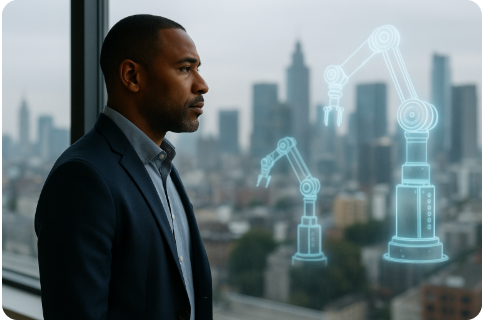
For centuries, people built their lives around one idea:
“If I work hard, I’ll always have a job.”
That was the foundation of the middle class — predictable income in exchange for predictable effort.
But that idea is collapsing.
AI and automation are replacing repetitive work at a speed no one prepared for. What once required 20 people now needs two — or none. Amazon’s warehouses use robots to move products. Meta uses algorithms to handle marketing. Even legal and finance roles are being automated by smart systems.
The world is quietly transitioning from the age of employment to the age of replacement.
And those who don’t adapt risk becoming professionally invisible.
The End of Job Security
Let’s be clear: AI isn’t the enemy — dependency is.
The wealthy aren’t panicking about automation. They’ve already shifted from earning income to owning systems that produce income for them.
That’s the fundamental difference between those who lose in technological shifts and those who profit from them.
While most people are asking, “Will AI take my job?” the elites are asking, “How can I own the technology that takes jobs?”
As discussed in Owning Your Future: Why Paying Upfront Can Bring You Peace of Mind, the powerful stay ahead by investing early — in systems, in assets, and in themselves.
The Skills That Machines Can’t Replace
AI is efficient. But it’s also predictable. What it can’t replace — yet — are judgment, adaptability, and creativity.
Those are the traits the elites double down on. They’re not becoming coders; they’re becoming strategists. They know how to combine technology with vision — and that’s where human value lives.
So if you want to stay relevant in this new economy, here’s the truth:
you need to start thinking like an owner, not a worker.
That begins with skill stacking — learning to merge human and technical ability.
Start by identifying three areas of growth:
- Digital fluency – Learn to use AI tools, automation platforms, and analytics systems.
- Financial structure – Understand how to manage and grow your own resources (see Designing Your Personal Financial System to Stay in Control).
- Creative leverage – Build something that scales without your constant presence — content, digital products, or intellectual property.
How the Wealthy Prepare for Disruption
1. They Diversify Income Before They Have To
The middle class waits for crisis; the wealthy plan for it.
They know every system breaks eventually — so they build multiple backups: assets, investments, and automated income channels.
If one stream dries up, another flows.
As explained in Smart Financial Moves for Key Economic Moments, financial flexibility isn’t a luxury — it’s survival.
2. They Don’t Compete With AI — They Partner With It
The elite are already using AI as leverage, not competition.
They use automation to buy time, not to fill time.
While most workers fear replacement, the wealthy use technology to multiply productivity.
The goal isn’t to outwork machines — it’s to direct them.
By building workflows that combine human creativity and machine precision, you position yourself on the winning side of the shift.
3. They Own the Platforms, Not the Paychecks
The future of wealth isn’t in labor — it’s in ownership.
The rich don’t ask, “What job can I get?”
They ask, “What system can I own?”
That’s why they invest in software, data, brands, or intellectual property — anything that works for them even when they’re not working.
You don’t need millions to start. Ownership can mean something as small as a monetized blog, a course, or a simple automation system that generates income on autopilot.
That’s the foundation of modern financial independence.
What You Can Do Now
- Audit Your Current Work. Ask yourself, “What parts of my job could be automated today?” Then learn the tools before your employer does.
- Stack Adaptive Skills. Combine creative, technical, and strategic knowledge — that mix is irreplaceable.
- Create Micro-Ownership. Build or buy one small system that can earn you money passively (digital products, e-books, affiliate income).
- Start Investing in AI Literacy. You don’t need to code — but you need to command.
Remember: automation doesn’t replace people; it replaces predictability.
Final Thoughts
The elites aren’t afraid of AI because they’ve already adapted to its rules.
They’ve shifted from trading time to building leverage.
For everyone else, this isn’t the end of work — it’s the end of comfort.
Because in this new world, security no longer comes from a paycheck.
It comes from ownership, adaptability, and vision.
And those who understand this now will build the future everyone else fears.

